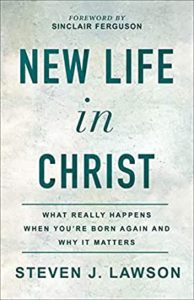
The New Birth Is Not What You Think It Is
To be called a “born-again Christian” today can mean many things. For some, it means you are a Bible thumping fundamentalist. For others, it means you are politically conservative when you walk into the voting booth. Still for others it means you were converted at one of the Billy Graham crusades. Unfortunately, the phrase means almost nothing anymore, watered down as it is by countless stereotypes. But what does the phrase “born-again” really mean?
In New Life in Christ (Baker Books, 2020), Steven J. Lawson moves beyond today’s (mis)use of the phrase to recapture its biblical meaning and extraordinary significance for the Christian life. With pastoral care, Lawson takes us back to that eerie late-night encounter between Jesus and Nicodemus in John 3. Nicodemus, like many today, was as religious as they come. By today’s standards, he would be the popular pastor or professor everyone knows and respects, going to heaven ahead of us all. Which makes Jesus’ response so…surprising: “unless one is born again he cannot see the kingdom of God” (3:5). The assumption is that Nicodemus has not been born again, which becomes all-too obvious when Nicodemus admits he has no idea what Jesus is talking about. “How can a man be born when he is old? Can he enter a second time into his mother’s womb and be born?” (3:4). But Nicodemus should know exactly what Jesus is talking about.
A Supernatural Event
As the teacher of Israel, Nicodemus should have been familiar with Moses and the prophets who, on many occasions, used a variety of metaphors to describe this second birth. Moses told the people of Israel they needed God to circumcise their heart, and Ezekiel promised Israel that one day God himself would act as surgeon, taking out her dead heart of stone and implanting a heart that beats. Jesus may switch metaphors to the delivery room, but the message is the same: unless the Spirit of God does something supernatural, something altogether new, something from another world, we will remain spiritually dead and lifeless. The reason Jesus’ words are so shocking is this: like babies in the womb, we can do nothing to bring about this new birth. Click To Tweet
Lawson is keen that we not overlook this depressing state we find ourselves in. And for good reason, too: scripture reminds us ad naseum that we are spiritually dead. The thing about dead people is that they are, well how do I put this, dead. We are a lot like Lazarus in the tomb: we stinketh. That is, until Jesus himself speaks words of resurrection life. Then we come alive. Or to switch metaphors, it is then that we are born again, made into a new creature.
Unfortunately, even the most well-meaning Christians today get this miracle backwards. We think the new birth is something we must do, or worse still, something we can do. But that misses the miracle of it all. It also misses the meaning of the metaphor: birth is something that happens to us, not something we accomplish. How much more so with matters of the heart? Lawson has a point when he stresses that the new birth—or what theologians like to call regeneration—is the work of the Spirit; it is not the work of any sinner. Jesus says as much when he tells Nicodemus that to be born again one must be born of the Spirit (Jn. 3:5). But like the wind, the Spirit is sovereign, blowing wherever it wishes (3:8).
The Shocking Implications
That might sound unnerving to evangelicals today. After all, what pastor hasn’t ascended the pulpit and said to those listening that no one can enter the kingdom unless they are born again? But Jesus is in the habit of turning preconceived assumptions upside down, even if it is Israel’s most renown Bible scholar he is talking to. The reason Jesus’ words are so shocking is this: like babies in the womb, we can do nothing to bring about this new birth. It is not something we initiate, nor is it a cooperative effort between us and God. It is completely God’s doing, a phenomenon so unnatural, so omnipotent it can only be attributed to the Holy Spirit. As Lawson reminds us, our belief in Jesus, our acceptance of Jesus, is not what motivates the new birth, as if God sits around waiting—hoping!—somebody somewhere will believe so that he can make them alive. No, apart from new life we will never believe. Our depravity is that pervasive; sin’s grip is that enslaving. In another audacious exercise ticking off Israel’s religious experts, Jesus not only tells the Pharisees that they won’t come to Jesus for life but he says they can’t come to him for life (Jn. 6: 44, 65). Not unless, of course, Jesus is the one to draw them; until then, they will never believe in the Father who sent him. Likewise with Nicodemus: unless he is first born of the Spirit, he will never believe in Jesus.
 If Lawson is right that the new birth produces faith and repentance (conversion), rather than vice versa, then I must say, Jesus’ words truly are liberating. What a burden has been lifted. We do not preach or evangelize as if we must somehow work the sinner over until he or she is willed into the kingdom. Let’s not forget: the new birth is supernatural in origin; its source is not human autonomy. We are more like the prophet Ezekiel: God tells us to speak words of life to a valley of dead, dry bones. Dead, that is, until they begin to rattle and come to life, flesh and all (Ezek. 37).
If Lawson is right that the new birth produces faith and repentance (conversion), rather than vice versa, then I must say, Jesus’ words truly are liberating. What a burden has been lifted. We do not preach or evangelize as if we must somehow work the sinner over until he or she is willed into the kingdom. Let’s not forget: the new birth is supernatural in origin; its source is not human autonomy. We are more like the prophet Ezekiel: God tells us to speak words of life to a valley of dead, dry bones. Dead, that is, until they begin to rattle and come to life, flesh and all (Ezek. 37).
Point is, let’s not forget who the miracle worker is: God, not us. We tell others about king Jesus, and then we wait and watch the kingdom fill up as the same Spirit who created the cosmos creates new life in hearts otherwise dead in darkness. No, we can’t see the wind. But we know its power because we see its effects: a kingdom full of new life in Christ.
**Editorial Note: This review was first featured in the July/August 2020 issue of Christianity Today**

